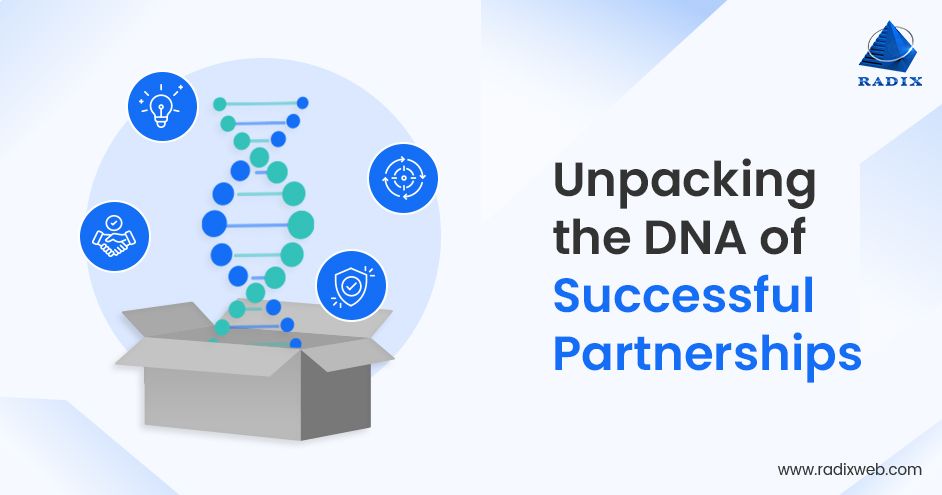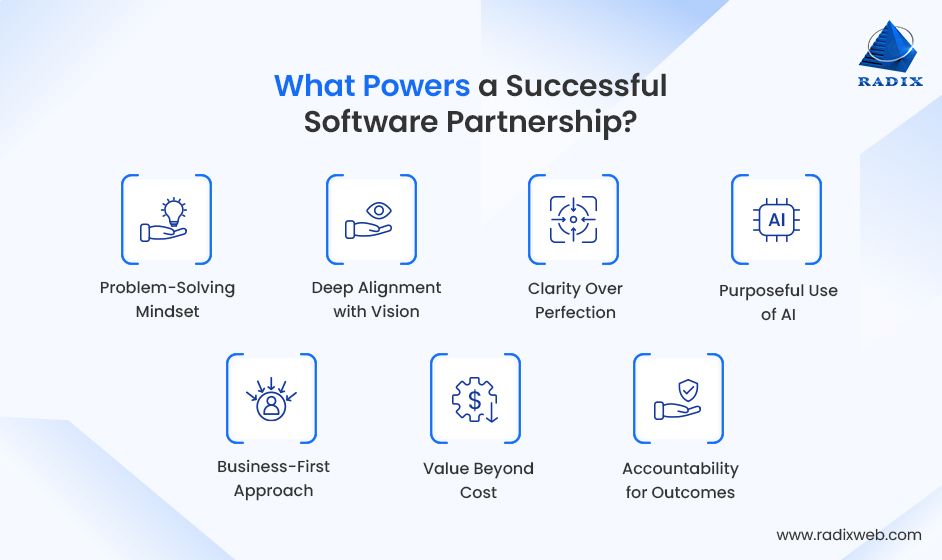Read More

Discover what’s next for AI in healthcare in 2026 - Get Access to the Full Report
We Asked Our EVP What Makes a Tech Partnership Work. Here’s What He Said.

Sarrah Pitaliya

“I have not just outsourced software development to you, but I think I also outsourced my product vision and roadmap to you."
When a client said this to Pratik Mistry, EVP Technology Consulting at Radixweb, it wasn’t just a compliment. It was a marker of trust, depth, and alignment.
Pratik Mistry is a technologist and business strategist who has been associated with Radixweb for 18+ years now. Over the years, he’s helped enterprises scale their software initiatives with precision and purpose, leading with one simple philosophy: value-first partnerships over vendor checklists.
Pratik reflects on his experience of hearing the client feedback and says, “That statement stayed with me. It told us we weren’t just delivering code. We were building something far more personal, more strategic.”
And that’s not a one-off. Over 25 years, Radixweb has heard this sentiment echoed across boardrooms, stand-ups, and client retrospectives.
Given the consistency and depth of these experiences, it made sense for me to sit down with Pratik for a no-filter conversation to get to the heart of the matter:
What actually makes a tech partnership successful?
What followed was a mix of tactical advice, leadership principles, and grounded truths that are rarely spoken so plainly in the industry.
Want to hear it from Pratik himself? Check out the unfiltered podcast here:
7 Ground Truths About Building Software Partnerships That Actually Work
During the conversation, I asked Pratik a lot of whats, whys, and hows. His answers reveal what really drives successful tech partnerships and what separates long-term collaborators from short-term vendors.

1. What is the one thing that has remained consistent in Radixweb’s 25-year journey?
Tools change. Technologies evolve. Teams scale. But one thing that’s remained consistent at Radixweb over the years is the problem-solving mindset. That’s what is the key driver of all our successful partnerships.
“... the core DNA of Radixweb has always been how are we able to solve the problem. So, taking ownership and trying to be a problem solver, that mindset has never changed.” says Pratik.
This mindset isn't about jumping to solutions. It’s about taking ownership, staying curious, and sticking with the problem until it gives.
2. What makes a tech partnership truly successful?
When asked that, Pratik was quick in pointing out that 'partnership' carries weight. He further explains that tech by itself is never an issue in the failed software partnerships.
Misalignment is. He further explains,
"... technology is not a big deal. But in order to make that partnership work long term, that alignment is very much important... As a team, you need to align with the goal and the vision of the customer, what they are trying to achieve. If you are able to align well with that, the success is bound to come."
Reflecting on what he has seen in his journey of close to 2 decades in the industry, he adds, that most of the failures that he has heard about were where the customer expectations and the team's focus were misaligned.
As Pratik has mentioned earlier also, when teams solve technical problems without focusing on the business aspect, failure becomes inevitable. To truly drive successful outcomes, we need to look beyond transactional engagement, towards future-focused partnerships.
3. What is more important – execution or ideation?
“If you try to make everything picture-perfect from day zero, you won't be able to get out of the whiteboard." says Pratik when I asked him about the execution vs. ideation debate.
He says instead of planning everything to perfection on day 1, break the complex into the small. Focus on small wins. Build clarity and momentum. That, according to Pratik, is what separates team that build momentum from those that get stuck in planning spiral.
The mindset shift he is advocating is clear: Less rigid long-term planning, staying agile and adjusting to market needs.
4. Is AI the silver bullet for software success?
Software development partnerships are often built on a layer of buzzwords that vendors flaunt. But Pratik doesn't believe in jumping on tech trends just for the sake of it.
Talking about the latest tech trend that's dominating every aspect of software development - AI - Pratik says, “If you see AI as a solution for your problems, you're bound to fail.”
"AI isn’t hype, it’s real" he clarifies, "But it’s only as effective as your ability to use it as one of the tools in your arsenal."
Even with something as common as ChatGPT, success depends on the human input. He explains that to get the right output, you need to give ChatGPT the right context. Writing the right prompt, that is the human part of it, and that's what matters.
5. How are successful tech partners different from the rest?
Radixweb recently celebrated its 25th anniversary and while the party was a blast, it only made sense to look back at the journey and explore what separates us from the rest.
When asked about the true differentiator, Pratik didn't sugarcoat things. He said, “There are hundreds and thousands of tech companies in the world. But we see ourselves as business enablers.”
For Radixweb, technology is the means, not the end. We focus on the customer’s business goals and are able to use technology to add value. That's how we have been able to grow as an organization.
That’s the lens Radixweb works with. Not tech-first. Business-first.
6. What’s a myth that stops businesses from gaining true value from a partnership?
“One misconception I would like to make clear… don't see outsourcing software development as a cost optimization play. It is a lot more than that.” says Pratik.
He makes it clear that yes, cost benefit is often a key part of the decision. But if it’s the only thing driving the relationship, expect it to break.
“If you just look at it with a narrow perspective of cost reduction, this will not go long term… You’ll end up getting into more trouble.”
Expectations matter. Great work doesn’t always come cheap. But it does deliver value. That value is what businesses should look for, instead of just using outsourcing as a discount coupon.
7. What makes or breaks a product team?
Towards the end of the discussion, when I asked Pratik that, he said something that resonated with me deeply.
"I think accountability. So, the product team has to be accountable for what they are delivering."
This isn’t about checking boxes or meeting deadlines. It’s about owning outcomes. If a tech team, or any team for that matter, can take that ownership, if they can take that accountability, they'll be able to do wonders.
The Radixweb Mindset: Tech Is Easy. Value Is Not.Pratik closes the conversation with a very important point. In our Rapid Fire segment, I asked him if building tech is easy, what’s hard. He almost instantly responded: value.Building tech is easy. What’s hard (and what actually matters!) is delivering value through that tech. Not handing off code and walking away, but standing alongside the customer, navigating complexity with them.“It’s not about just taking money, building it, and giving it back like ‘now it’s your problem.’ We’re actually navigating that problem along with them” said Pratik.That’s the difference. That’s the Radixweb way.For 25 years, we’ve done more than ship software. We’ve helped businesses turn technology into outcomes. Because while anyone can build products, very few can build value that lasts.And we’re just getting started.Have more questions for Pratik? Drop us a line at biz@radixweb.in or schedule a quick one-on-one with us here.
Ready to brush up on something new? We've got more to read right this way.




